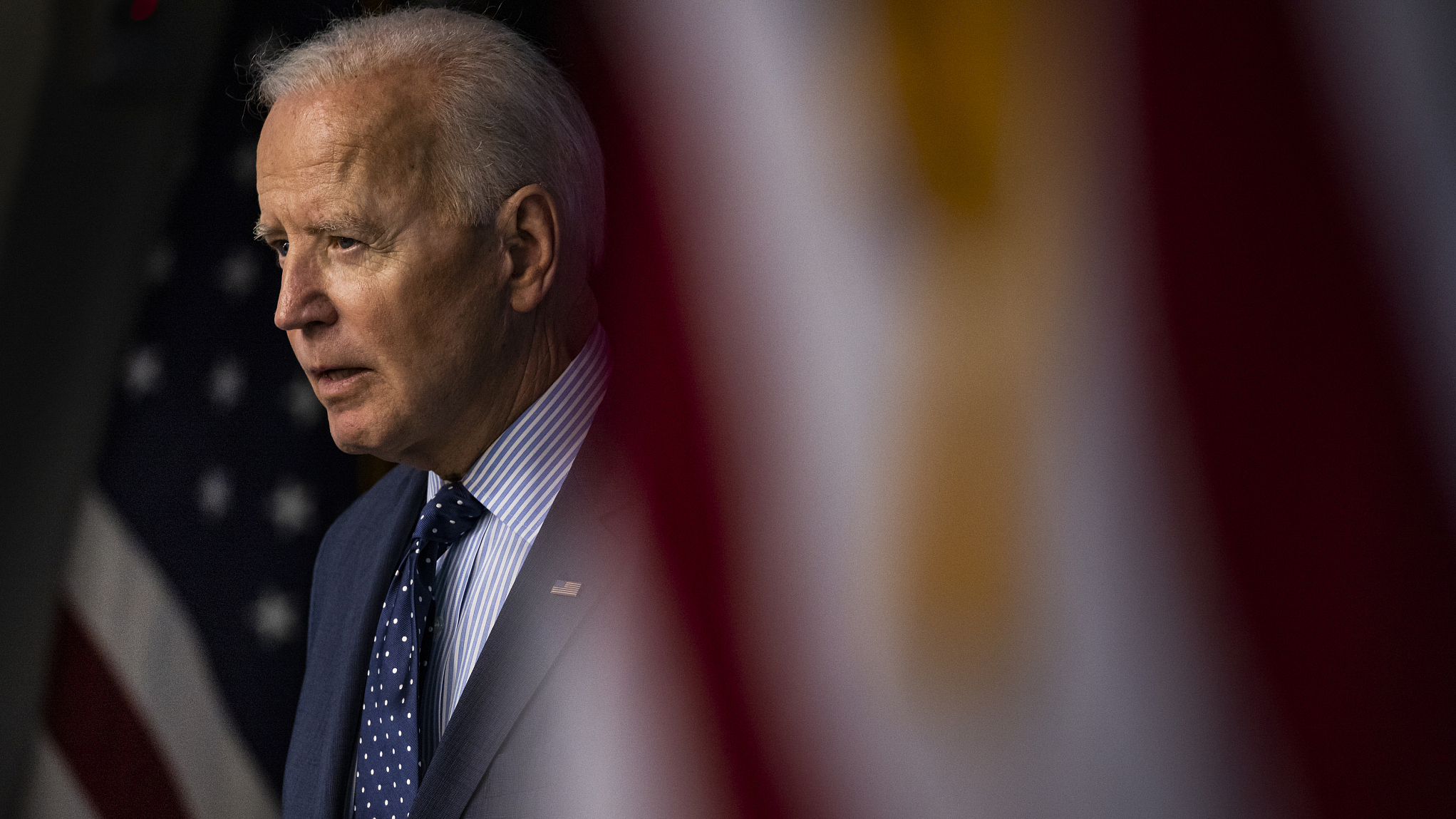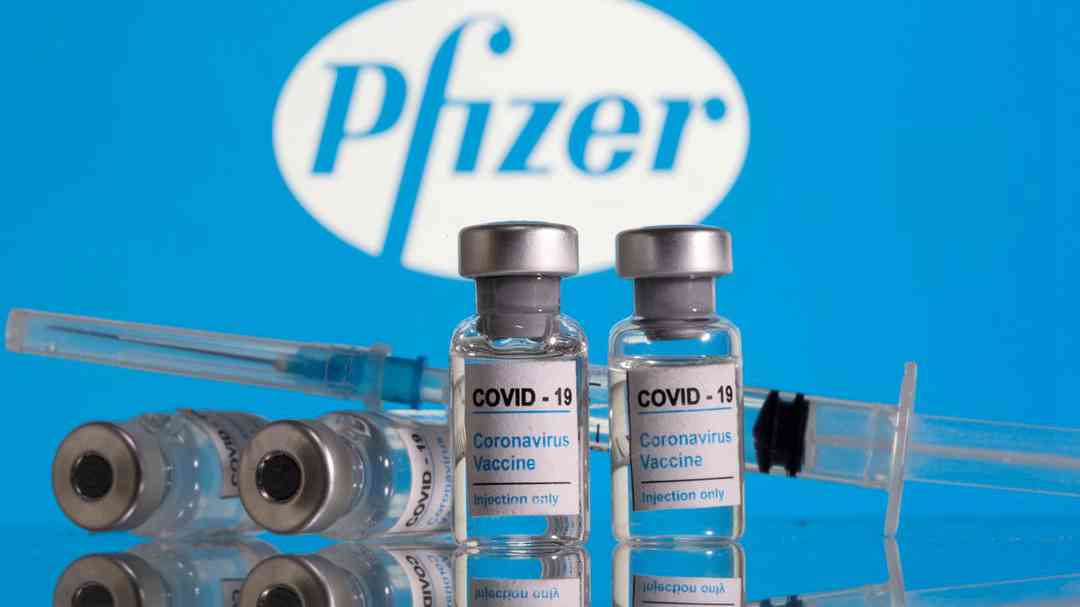
U.S. President Joe Biden speaks in the Eisenhower Executive Office Building in Washington, D.C., U.S., June 2, 2021. /VCG
U.S. President Joe Biden speaks in the Eisenhower Executive Office Building in Washington, D.C., U.S., June 2, 2021. /VCG
Editor's note: Anthony Moretti is an associate professor at the Department of Communication and Organizational Leadership of Robert Morris University. The article reflects the author's views and not necessarily those of CGTN.
When world leaders come together, they sometimes just cannot help themselves. They need to make big, broad and boastful promises in order to ensure the attention they are receiving is validated.
Wednesday was one of those days in Washington. U.S. President Joe Biden announced at a global gathering on coronavirus that the United States will purchase 1 billion doses of the Pfizer vaccine with the guarantee that every dose will be used to vaccinate people in many of the world's poorest countries.
This is the kind of leadership America should be providing, and Biden's promise is another reminder of the shameful way in which his predecessor either blamed a certain country for causing the coronavirus pandemic or simply ignored the crisis as it worsened. Nevertheless, we need to be cautious before we stand too quickly and applaud too loudly in recognizing what has been pledged by the United States.
In reviewing the president's guarantee, the Associated Press reported the following: "The U.S. purchase of another 500 million shots brings the total U.S. vaccination commitment to more than 1.1 billion doses through 2022. About 160 million shots supplied by the U.S. have already been distributed to more than 100 countries … The remaining American doses will be distributed over the coming year."
Nowhere in the AP story was an acknowledgment that China plans to donate 2 billion vaccines doses – or double the amount offered by Biden – before the end of this calendar year – or in three months instead of 15.
You read that correctly: Double the doses in roughly one-fifth of the time. And just in case you were thinking that information about China was not relevant to what the president was planning, please remember that plenty of stories in the Western media reviewed how the European Union was lagging behind the United States in exporting vaccines across the globe. Put more bluntly: The president's pledge looked better when compared to Western Europe, but it would have looked paltry if China's commitment had been brought into the media discourse.
The New York Times provided a bit more realism in its reporting, stating: "Mr. Biden has been under intense pressure from global health experts to do more to address the vaccine shortage – and in particular expand manufacturing around the world. Biden said the U.S. is doing so, through a partnership with India, Japan and Australia."

Vials labelled "COVID-19 Coronavirus Vaccine" and a syringe are seen in front of the Pfizer logo, February 9, 2021. /Reuters
Vials labelled "COVID-19 Coronavirus Vaccine" and a syringe are seen in front of the Pfizer logo, February 9, 2021. /Reuters
Did anyone notice which Asian nation the U.S. did not include in the partnership? Why do you think that might be? Would the fact that China is prepared to do more than the U.S. over the next three months be a sufficient reason to keep it out of this partnership? Makes one wonder, right?
The New York Times also acknowledged that the president made a major gaffe the first time his administration made a big deal out of supplying vaccines around the world: "When President Biden announced in June that the United States would buy 500 million Pfizer-BioNTech coronavirus vaccine doses for poorer nations, there was a gaping hole in his plan: To fund it, the administration quietly diverted hundreds of millions of dollars that had already been promised to countries for helping to get shots into people's arms." One can only imagine the furor that would have been evident if China had done such a thing.
Undoubtedly, Americans are probably reading this and thinking that I am being unnecessarily critical of the U.S. Even if we accept such criticism is valid, I ask those people to remember the U.S. continues to assert it's perfectly acceptable that millions of Americans receive a booster vaccine (in effect a third shot) before millions of people around the world receive their first. Moreover, we must remember what Reuters reported on Wednesday: "The Pfizer vaccine is difficult to scale up and to administer in poorer countries, which lack sophisticated infrastructure for storing and shipping shots."
However, China's vaccine does not have that problem. Wednesday's reporting of the Biden announcement did not include anything China is doing as the fight against the pandemic carries on. Something less than the full story was shared with U.S. and Western audiences.
Finally, news that a team of respected Chinese scientists has concluded "with a high confidence probability" that coronavirus was evident in the U.S. as early as September 2019 made no dent in the Western media. September would be roughly two months before the intense scrutiny began of what was happening in Wuhan. And remember The New York Times reported just a couple of weeks ago that a research has found coronavirus antibodies in blood samples dating back to September 2019.
Pointing a hostile finger at China makes for plenty of headlines in the U.S.; pointing a complimentary finger at China is a headline killer. Much more needs to be done to eradicate this nasty virus, and cooperation between the world's two legitimate global powers would help.
(If you want to contribute and have specific expertise, please contact us at opinions@cgtn.com.)

